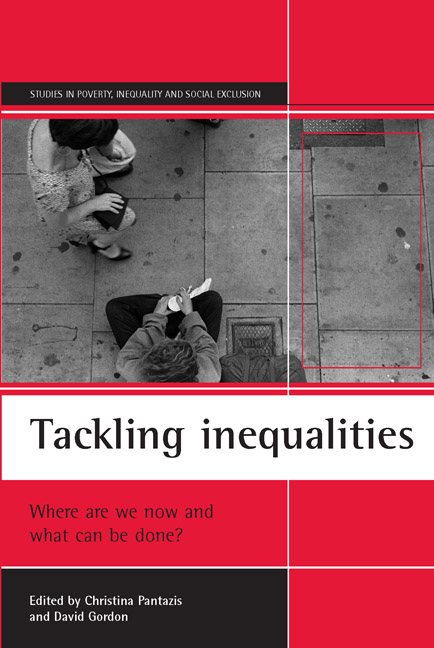Book contents
- Frontmatter
- Contents
- List of tables and figures
- Preface
- Acknowledgements
- List of acronyms
- Notes on contributors
- 1 Introduction
- 2 Inequalities in income, wealth and standard of living in Britain
- 3 Inequalities in employment: problems of spatial divergence
- 4 Educational inequalities and Education Action Zones
- 5 How can we end inequalities in housing?
- 6 Tackling inequalities in crime and social harm
- 7 Poverty across the life-course and health
- 8 Inequalities in health service provision: how research findings are ignored
- 9 A mortality league table for Cabinet ministers?
- 10 Ending world poverty in the 21st century
- Index
2 - Inequalities in income, wealth and standard of living in Britain
Published online by Cambridge University Press: 05 July 2022
- Frontmatter
- Contents
- List of tables and figures
- Preface
- Acknowledgements
- List of acronyms
- Notes on contributors
- 1 Introduction
- 2 Inequalities in income, wealth and standard of living in Britain
- 3 Inequalities in employment: problems of spatial divergence
- 4 Educational inequalities and Education Action Zones
- 5 How can we end inequalities in housing?
- 6 Tackling inequalities in crime and social harm
- 7 Poverty across the life-course and health
- 8 Inequalities in health service provision: how research findings are ignored
- 9 A mortality league table for Cabinet ministers?
- 10 Ending world poverty in the 21st century
- Index
Summary
Introduction
During the past 100 years, literally thousands of scientific papers have been published that discuss some aspect of inequalities in income, wealth or standard of living in the UK. However, a large number of these papers fail to define these terms adequately and often confuse inequality (and particularly income inequality) measures with poverty. Yet, these two concepts are distinct (Gordon and Spicker, 1999).
Given the high level of academic interest in inequality in Britain, there have been surprisingly few comprehensive analyses. During the 1970s, Tony Atkinson produced and edited a number of excellent studies on inequality (Atkinson, 1972, 1973, 1975) cumulating in his comprehensive book The economics of inequality, the second edition of which was published in 1983. The Joseph Rowntree Foundation's Inquiry into income and wealth updated some of Atkinson's work (Barclay 1995; Hills, 1998), but the only recent book on inequality in the UK, by the Institute of Fiscal Studies (Goodman et al, 1997), has a very different character. Atkinson's studies examined inequality in income and wealth, the distribution of earnings and the causes of the growing divide. He produced proposals for wide-ranging changes to the tax and social security system to reduce inequality. By contrast, the Goodman et al (1997) book deals almost exclusively with changes in income and expenditure, contains numerous factual errors in its brief discussion of poverty and, extraordinarily, makes no policy suggestions. The study of inequality is seen as a subject of dispassionate academic interest, devoid of concern for the victims of the growth in inequality. The authors display no desire to reduce inequality, merely to study it. What is of particular concern is that one of the authors, Stephen Webb, is now the Liberal Democrat Spokesperson on Social Security.
Defining income
Income is an extremely difficult concept to define and measure. The term is sometimes used loosely to refer only to the main component of monetary income for most households – wages and salaries or business income. Others use the term widely to include all receipts including lump sum receipts and receipts that draw on the household's capital.
Classically, income has been defined as the sum of consumption and change in net worth (wealth) in a period. This is known as the ‘Haig-Simons approach’ (see Simons, 1938 in Atkinson and Stiglitz, 1980, p 260).
- Type
- Chapter
- Information
- Tackling InequalitiesWhere Are We Now and What Can Be Done?, pp. 25 - 58Publisher: Bristol University PressPrint publication year: 2000



